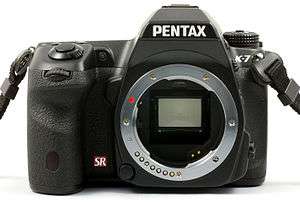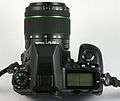Pentax K-7
The Pentax K-7 is a 14.6-megapixel digital single-lens reflex camera, announced on 20 May 2009.[1] This is the first new flagship model released by Pentax since its merger with Hoya Corporation on 31 March 2008. It was discontinued late in 2010 in favour of the K-5.
 | |
| Overview | |
|---|---|
| Type | digital single-lens reflex camera |
| Lens | |
| Lens | Interchangeable Pentax KAF3 and KAF2 mount compatible with Pentax auto-aperture lenses; older lenses supported in stop-down metering mode. |
| Sensor/medium | |
| Sensor | APS-C (1.54×) CMOS active pixel sensor with a primary color filter |
| Maximum resolution | 14.6 megapixels |
| ASA/ISO range | ISO Auto, 100, 200, 400, 800, 1600, 3200, boosted: 6400 |
| Recording medium | SD, SDHC; SDXC with firmware update 1.12 or later |
| Exposure/metering | |
| Exposure modes | Hyper Program, Hyper Manual, Sensitivity Priority, Shutter-Speed Priority, Aperture Priority, Shutter-Speed and Aperture Priority, Manual, Bulb, Green (Auto) |
| Exposure metering | TTL open-aperture metering with choice of: 77-segment, Center-weighted & Spot meter |
| Flash | |
| Flash | Onboard pop-up flash with high-speed sync, P-TTL external flashes via hotshoe, PC socket external flash, 1/180 s X-sync speed |
| Shutter | |
| Shutter speed range | 1/8000 s – 30 s, Bulb |
| Continuous shooting | 5.2 frames/s up to 40 JPEG images or 15 RAW images |
| Viewfinder | |
| Viewfinder | Eye-level pentaprism, near-100% coverage, 0.92× magnification |
| General | |
| Rear LCD monitor | 3″, 640×480 (VGA) |
| Battery | Rechargeable D-LI90 lithium-ion battery, optional AC adapter |
| Weight | 670 g (body only), 750 g (with battery) |
Features
The Pentax K-7 was announced on 20 May 2009 and shipping began as of the first week of July 2009. The K-7 has the same pixel count as its predecessor, the K20D, but offers a significantly expanded feature set in a smaller body. New features include:[2][3]
- body is still weather resistant like the K20D; however, it is now made of magnesium alloy, and it is now also low temperature resistant
- a high-definition video recording function (30 frames per second at 1536×1024 resolution or HDTV (cropped))
- TAv exposure mode: Time/Aperture Value: photographer sets his own desired shutter speed/aperture, while the camera adjusts the ISO accordingly to compensate exposure
- in-camera high dynamic range imaging function to create one composite image from three images with different exposures
- dedicated AF-assist lamp
- in-camera electronic level that works with Earth's gravity, usable in total darkness too (a 1st by Pentax in any camera model from any brand)
- automatic horizon correction
- a new shutter rated for 100,000 actuations and capable of shutter speeds as fast as 1/8000 second
- continuous shooting speed of up to 5.2 frames per second
- a viewfinder with 100% field coverage
- a new Natural-Bright-Matte III focusing screen
- a new autofocus module
- a 77-segment light meter
- a newly developed DR II dust removal system
- a 3″ LCD monitor with a wide angle IPS panel with approximately 921k dots
- Face recognition in live view mode
- a new-generation Shake Reduction mechanism which can compensate for rotational movement
- lighter weight: the K-7 body weighs 55 g (7.5%) less than the K20D
- very quiet shutter[4]
gollark: Not equal?
gollark: Okaaaay...
gollark: ₱29∅9
gollark: I'm pointfree now!
gollark: I guess?
References
- Richard Butler (2009-05-20). "Pentax K-7 Hands-on Preview". DPReview. Retrieved 2009-05-20.
- "Preview on dpreview.com".
- "Official Pentax Imaging Web Site K-7 Highlights". Archived from the original on 2010-10-05. Retrieved 2010-08-31.
- Mike Johnston (2009-05-20). "New Pentax Flagship, the K-7 (an early user review)". Retrieved 2009-05-20.
External links
| Wikimedia Commons has media related to |
- Official web page for the K-7 at PentaxImaging.com
 back side with display
back side with display body with zoom lens
body with zoom lens view from above
view from above Pentax K7
Pentax K7
This article is issued from Wikipedia. The text is licensed under Creative Commons - Attribution - Sharealike. Additional terms may apply for the media files.